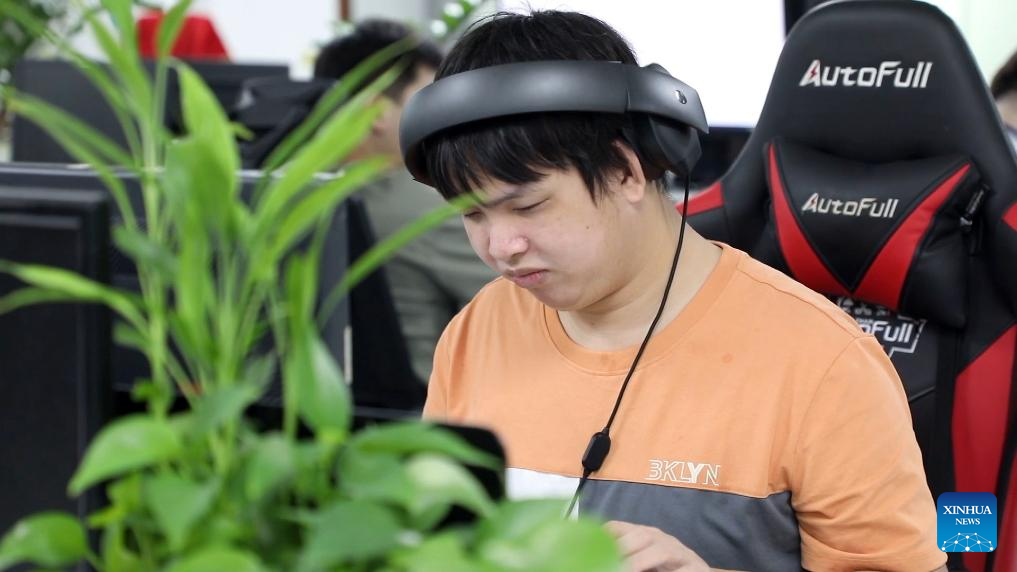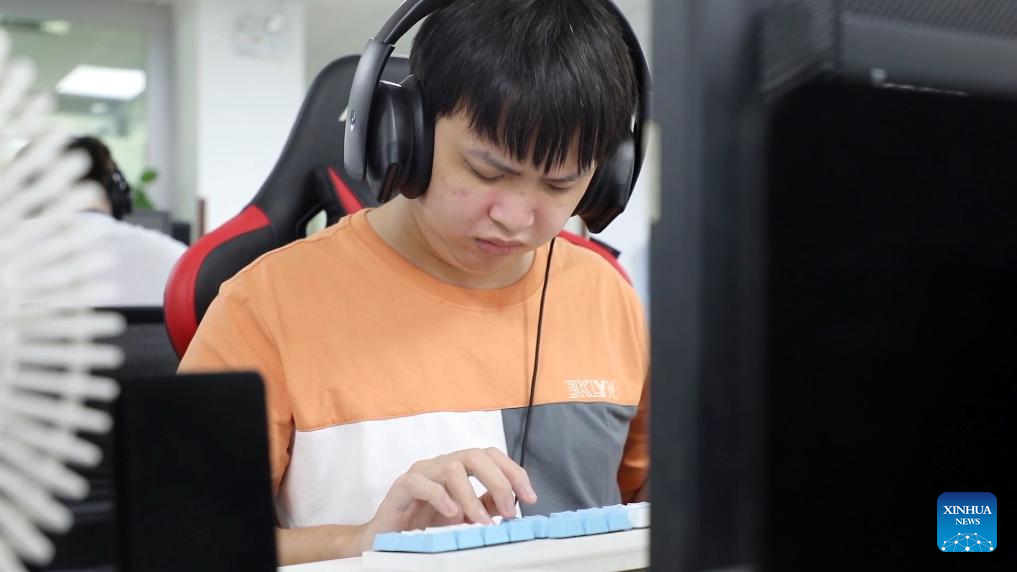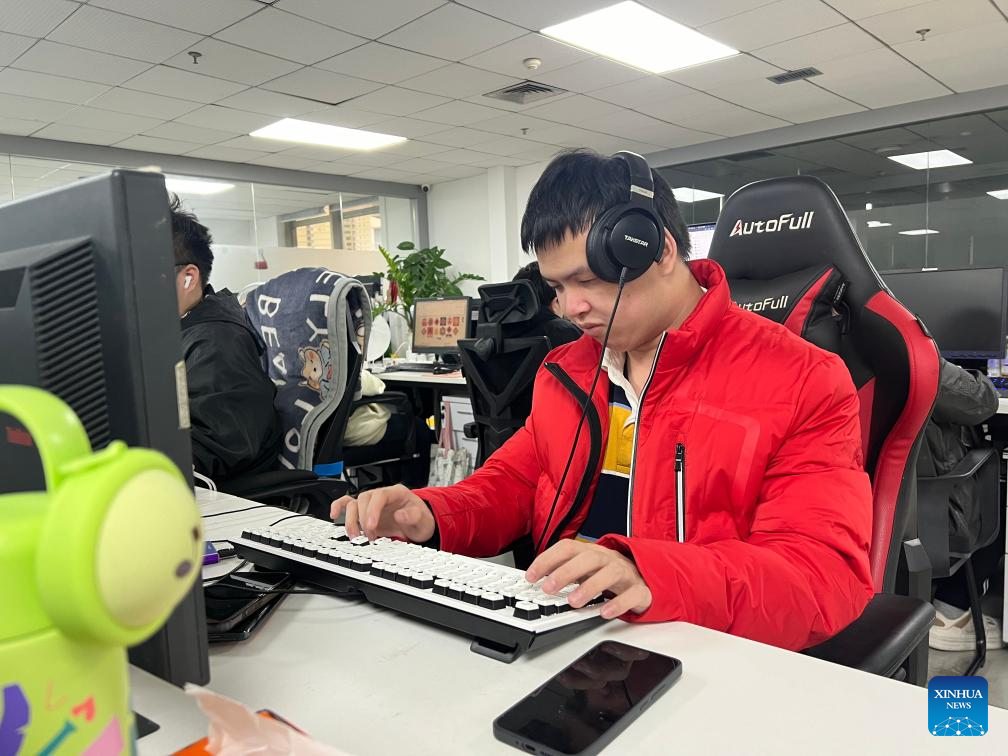
Shen Guangrong works at the Accessibility Research Association in Shenzhen, south China's Guangdong Province, Sept. 6, 2023. (Xinhua/Huang Guobao)
GUANGZHOU, Dec. 21 (Xinhua) -- A new online computer game has been created with a dominant hue of white, no graphic elements, no special visual effects and no background music.
It seems to break all the rules of game design, but for more than 1,000 visually impaired players, it provides a colorful fictional world that integrates various functions, including combat, handicrafts and making friends.
The game's designer is Shen Guangrong, a blind engineer working in the tech hub of Shenzhen in south China's Guangdong Province.
"Programming gives me a sense of accomplishment, because I can make barrier-free software products for my friends who also belong to the visually impaired group, and they give me feedback after using the products," the 27-year-old said.
Shen works at the Accessibility Research Association, a Shenzhen-based social organization focused on research into China's barrier-free development. Through the organization, he has been providing accessibility services to visually impaired people for eight years.
Born with congenital blindness, Shen said the vast majority of his daily life depends on various kinds of sound. "Sound, touch and smell are the ways in which I experience the world," he said.
He encountered various difficulties as a child due to his condition. "Once, when I was receiving orientation and mobility training at a special school, I heard someone talking about me behind my back. That caused me to experience various ups and downs mentally," he said, adding that he soon managed to regain his confidence.
One thing that gave him great joy as a child was playing with computers.
"I've been interested in computers since I was a kid. I thought that all the programs on computers were amazing, and that they could help me do all kinds of things," he said.
Like many visually-impaired people, he made use of screen readers, which are text-to-speech software applications that read aloud the content of a computer screen. However, Shen gradually came to realize that some programs were not compatible with such technology, and it was partly this fact that spurred him to learn about programming and how to modify applications.
During junior high school, he learned programming by listening to books, watching videos and talking to more experienced programmers.
In 2015, when he graduated from senior high school in his home city of Guangzhou, Shen was faced with two options: getting a job or going to college. It was in the same year that he saw a recruitment ad for the Accessibility Research Association.
"I thought I'd give it a try," said Shen.
He submitted his application and was successful, moving to Shenzhen to start his career as an engineer.
Over the years, he has participated in the barrier-free design of tech companies and helped them improve functions to make their products more accessible.
Besides designing programs, Shen has always nurtured the dream of crafting games. More than three years ago, he began to design a game exclusively for the visually impaired. At that time, the e-sports industry was booming in China, but there were few games specifically designed for the visually impaired.
"Little by little, I developed the game from scratch," he recalled. "I communicated with others and found others to experience it, turning the small product into a relatively free game world."
It is a computer game without graphics, in which the players judge the surroundings of the game world based on different sound cues converted from text information that appears on the screen. They run around in an imaginary world where they both play and survive, performing a wide range of tasks. In addition to the game mode, players can interact with each other by doing crafts and write their own creative ideas.
Over the years, Shen has been polishing and modifying the game, which has more than 300 versions.
Although the game is still at the beta stage, it already has over 1,000 visually impaired players. Some of them have volunteered to work with Shen to collect feedback on problems encountered in the game.
Not long ago, Shen achieved his goal of holding an e-sports competition for the visually impaired. After learning about his wish, an internet platform decided to help Shen, bringing together some visually impaired e-sports players to participate offline.
There are some 17 million visually impaired people in China. Through the efforts of the country and the awareness of the general public, the life of many visually impaired citizens has changed for the better.
A new law on building a barrier-free living environment came into effect on Sept. 1, 2023, which will guarantee the rights of people with disabilities and the elderly to engage fully in social life, ensuring both convenience and equitable access for all.
The law stipulates that the construction, renovation and expansion of facilities such as residential and public buildings, transportation, and urban and rural roads should meet the standards for barrier-free facilities.
This new law includes targeted provisions on enhancing barrier-free services in medical and health care, social security, financial business and other scenarios closely related to social life.
Yang Hua, secretary-general of the Accessibility Research Association, said that visually impaired people can also play games and participate in e-sports competitions.
"We also recruit visually impaired engineers because we hope that in addition to using their skills to better promote the implementation of barrier-free features in our products, the job itself will allow them to better integrate into society and better realize their social value," Yang added.
"In the future, I will not set limits for myself anymore," said Shen, who also sings songs, listens to novels and goes out shopping during his spare time. "As long as I take every step in a practical way, who knows what kind of achievements I will make!" ■

Shen Guangrong works at the Accessibility Research Association in Shenzhen, south China's Guangdong Province, Sept. 6, 2023. (Xinhua/Huang Guobao)

Shen Guangrong works at the Accessibility Research Association in Shenzhen, south China's Guangdong Province, Dec. 21, 2023. (Accessibility Research Association/Handout via Xinhua)



